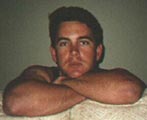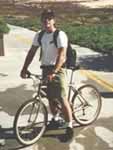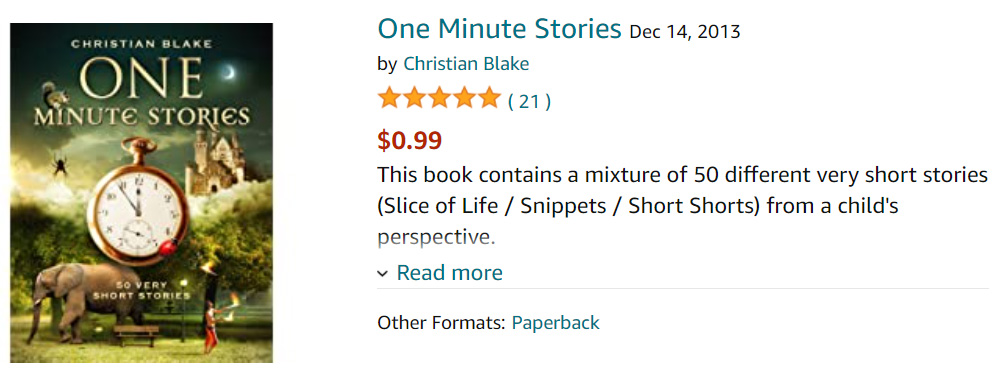About
Christian Blake
Who Is Christian Blake?
![]()
Biography
|
Born: February 3rd, 1970, Whittier CA Ethnicity: Spanish/Mexican/French/German Raised primarily in Orange County, CA with a few childhood years spent in Eugene, Oregon. Graduated from Sonora High School 1988, La Habra, CA First published at age 19 with The Coming. Adopted the pen name Christian Blake for this publication and the name stuck. Attended UA Local 709 Fire Protection school based in Whittier, CA 1989-1994. I began writing short fiction in the second grade. My teachers and classmates loved my storytelling style. I remember one particular story where the hero beat up the bad guy with a bag of potato chips. My classmates laughed so hard at the potato chip beat-down that I actually had to stop reading until they gathered their composure. I remember being annoyed that they found it funny because I had been trying to write a serious spy adventure and hadn't meant for it to be humorous. I continued to write fantasy and horror fiction until I was sixteen.Then I quit writing, at least for a while. I started working in the construction industry at age 15 for my father's company in Fullerton, CA. That's when I began to learn about the fire protection industry, specifically fire sprinkler engineering. I went to work full time for his company after I graduated high school. I also applied for UA Local 709, a fire protection design and installation school based in Whittier, CA. Although I had opted for the construction world, I still desperately wanted to write fiction for a living but didn't know if anyone would even be interested in reading my work. So I decided to submit three of my short stories: The Coming, The Magic Word, and a third story that I can't remember the title. I remember believing the third story was the strongest both in writing and in story content. I submitted it to several small press magazines but nobody would accept it. It wasn't until many years later that I happened to read a short story from a very famous author. His story was very close in storyline to mine but altogether different in writing style. Realization hit me that my story probably looked like a ripoff of this previously published work (which was, and still is, a very famous story). Out of those three stories I submitted, The Coming was accepted and published on its first submission. The Magic Word was never accepted for publication and I submitted it to only a handful of magazines. I remember thinking that one acceptance out of three story submissions wasn't very good and I probably wasn't destined to be a writer. In September of '89 I was accepted into the five year fire protection training program and I later graduated in '94. I returned to my father's company where I helped manage the corporation off and on for the next six years. When I was a child I used to visit my grandfather at his home in Whittier, CA. His name was Budweiser. I loved going over to his house because he was one of a few local bookies in town and he was always busy plying his craft. He had converted a family room into an office that was dedicated to his gambling business. There were televisions and radios and several phones that always seemed to be ringing. He would chain smoke, talk incessantly on the phone, and constantly scribble notes into one book or another. Of all the sports he took bets on, I became fascinated with horse racing and often questioned him about how to beat the races. He would always give me the same answer, "The only way to beat the races is not to play them". During the winter of '94 I decided to try my hand at being a professional gambler. I took a 5 month leave from work in order to follow the '94-'95 harness racing meet at Los Alamitos racetrack in Los Alamitos CA. I soon developed my own software to analyze a standardbred's performance based on the fractional times of the race. This software enabled me to end the meet with a $25,000 profit. Although I had beaten the races, the experience was a tremendous strain on the relationship I had at the time (beating the races is possible but it becomes a full time job when you get serious about it. I had invested close to sixty hours a week for five months straight in order to realize a net profit of only $25,000). The strain, dedication, and stress of professional gambling was not worth the payoff. However, I had proved that I could beat the game, which was satisfaction enough. From horse racing I moved to investing in the stock market. I don't believe there's much difference from investing in horse racing to buying stocks. Horse racing is tougher and much more harsh because you find out in about ninety seconds if you made a good decision or not. With stocks, it might take a year or more before you find out you screwed up. Wagering on horses for a living requires nerves of steel and uncompromising decision making. You have to be able to handle watching $500 or a $1,000 run around the track and hope that the jockey doesn't fall off or something equally ridiculous doesn't happen. With stocks, all you need is patience. I returned to construction after the harness racing meet in April of '95. In my free time I studied stocks using some of the same techniques that I had developed while handicapping the races. After a few months of researching a handful of companies, I felt I was knowledgeable enough to tackle Wall Street and I invested $3,000 in various stocks. Ten months later it was worth $40,000. I had been correct on 11 of 13 stock investments. Although I probably could have turned that $40,000 into $200,000 or more over the next year, I was in all honesty bored with the stock market. I stopped trading stocks and cashed out my account. In late 1996 I decided that I was also bored of the construction world and tired of Los Angeles traffic. I literally gave away everything I owned, including a condomuinum which I had purchased when I was 19. By October of '96 I had successfully reduced my material belongings to what I could fit inside my car. I left LA and drove up to Oregon with nothing but some clothes and a little cash (by then I had about $20,000 left over from my stock market investments). I moved in with one of my cousins who lived at the base of Mt. Bachelor, in a small city called Bend. I bought a few snowboards, a ski pass, and spent the rest of the winter snowboarding. That was probably one of the best winters of my life. During that winter of snowboarding, I returned to writing but I decided that I no longer wanted to write short fiction and took up screenwriting. My first script, which I wrote during that winter, was based on my first published piece of writing titled The Coming. The title of the script was Jen. Believe it or not, snowboarding seven days a week started to get monotonous, so I went to work part-time for Mt. Bachelor. I worked for them until February of '97 when they fired me. I had lent my ski-pass to a friend of mine and the mountain terminated my employment; apparently lending your pass to other people was a major no-no. They not only fired me, but they also took my ski pass. I couldn't snowboard on that mountain for the remainder of the season. I had met a girl during that winter who lived in a small town called Veneta, which was about a 2 hour drive from Mt. Bachelor. After I got fired, I packed up my car and headed over to her place and stayed with her for the next four months. It was the perfect place to finish writing my script. She lived on a vineyard and produced her own brand of wine. It was good times. But good times never last and goodbyes are inevitable. When I was nearing completion of the script, I decided it was time for me to return to southern California. Not only that, but I was completely out of money. I had to call my brother and have him wire a few hundred dollars just so I could make the drive back to Los Angeles. I went back to work full time for a few years before moving to Huntington Beach in '99. How I first discovered the seven moments When I returned to Southern CA I wrote a second script about a traveling drug dealer. I submitted the script to an online company who provided what is called "cover". Their review of my script was not favorable to say the least. I decided to improve my working knowledge of screenwriting and bought every book imaginable on how to write a script. None of the books impressed me. Even the so-called guru's of screenwriting did nothing more than talk in theory and subjective perspective. I wanted a roadmap; something that clearly dictated what needed to be on the screen and in the dialogue. But that roadmap didn't exist. In 2000 I decided the best way for me to learn what belongs in a script was to study the highest grossing films over the past ten years. Reverse-engineering, so to speak. Why bother figuring out how to write a script when I could simply disect the best movies Hollywood had to offer? I reduced my weekly working hours to only 16 hours a week which earned me enough money to pay my rent, utilities, and buy a few groceries. The rest of my time I devoted to studying movies. On an average day I would watch two movies. Some days I would watch five. Understanding why a movie worked and was successful at the box office turned out to be a lot harder than deciphering horseracing or even the stock market. There was so much subjectivity within a movie that it made it very difficult to pinpoint exactly what factors compelled people to spend their money at the box office. Consequently, this independent study of film turned into an eighteen-month obsession. At around fourteen months of movie-watching I found myself extremely frustrated. I had not solved the mystery. I had glimpses of the truth but could not quite put the puzzle together. My lack of progress annoyed me to such an extent that I took things to a new level and started dictating the movies as I watched them. Every action and every word of dialogue on screen I would type into my laptop and later review. I hit play/pause so many times that I eventually burned out my DVD player and had to buy a new one. After a few months of dictating the movies, I began to see similarities between movies, or rather similarities between scenes. I remember the exact moment I deciphered the first piece of the puzzle. I was eating breakfast at a greasy spoon restaurant in Fullerton called George's Hamburgers. If you're ever in Fullerton, grab a bite to eat there. They have great food. Anyway, I was eating bacon and eggs and reviewing my notes for L.A. Confidential when the first of the seven moments jumped off the page and slapped me. The discovery was that shocking and that obvious. I stared at the page for several long minutes before I finally accepted what I had just figured out. Then I flipped through the rest of my L.A. Confidential notes and found the same moment, repeated quite often. I remember thinking, "This can't be that easy". A few short weeks later I had seven clearly-defined moments that are repeated hundreds of times throughout the course of every movie. I would later track these moments when they occurred in some of the highest grossing movies. To be fair, I also tracked the box-office flops. The results only further convinced me: the box office winners typically had over seven hundred instances of the seven moments! The movies that were mediocre or were outright failures ranged between 300 and 500 occurrences. I wrote the seven moments on a piece of paper and kept it tucked away inside my wallet. I've gone through four wallets without losing those notes. Over the years I realized that these seven moments are all around us in every day life. Everything we experience can fit into one of these seven categories. These moments are the sum of our experiences. That's why people go to the movies; where else are they going to experience that much humanty in surch a short period of time? I've tried to invalidate my own findings. I've even tried to find additional moments that really matter in life (and movies) but I haven't found any that are significant enough to rival or replace the original seven. Life: The seven moments that really matter. In December of 2005 I decided it was time to share my discoveries with the rest of the world. I made a commitment to finish the book within 12 months and have it available for others to read. It's now September of 2006 and I've not only completed the version that applies to every day life, but I've also written an edition specifically geared towards screenwriters, actors, and filmmakers. For the price of a fast food meal, you can learn what took me eighteen months of intensive film study to figure out. If you want to improve your daily enjoyment of life, then Life: The seven moments that really matter is a must read for you. This book will make you aware of the seven moments so you can actively appreciate them when they occurr. It will also show you how to automatically generate the seven moments by performing only one specific action. This book is an invaluable read for mature and young readers. It also makes a great gift. Buy it today. If you're a screenwriter, filmmakaer, or actor, you need to read Screenplay: The seven moments that will captivate your audience. The screenwriter edition of this book focuses on how to apply the seven moments to keep your audience interested. It even has sub-categories for two of the moments. If you write screenplays, this book will help you write your story and help you spot the weak scenes and strengthen them. If you're a filmmaker, it can help you determine which script to move forward with and which scenes to bypass shooting altogether. If you're an actor, this book will help you choose between scripts; you'll be able to spot the winners from the losers. Regardless what part of the film industry you work in, this book will save you time and money and help you focus on the scripts that are worthy of your best efforts. |







